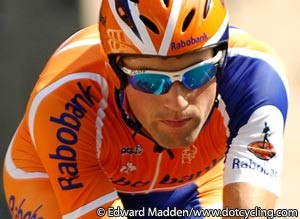Rabobank rider factored heavily in the critical final phase of Sunday’s road race
 Paul Martens’s season has been an up and down affair. The native of Rostock, Germany’s season got off to a great start with strong rides early on, highlighted by a huge effort in support of teammate, Oscar Freire, en route to his fourth Milan-Sanremo triumph, as well as top finishes at the E3 Prijs (8th), Brabantse Pijl (4th), Amstel Gold Race (11th), and Liege-Bastogne-Liege (14th).
Paul Martens’s season has been an up and down affair. The native of Rostock, Germany’s season got off to a great start with strong rides early on, highlighted by a huge effort in support of teammate, Oscar Freire, en route to his fourth Milan-Sanremo triumph, as well as top finishes at the E3 Prijs (8th), Brabantse Pijl (4th), Amstel Gold Race (11th), and Liege-Bastogne-Liege (14th).
The consistently improving rider who now calls Belgium home, met a major delay in his forward progress following a crash at the Criterium Dauphine in June. The crash damaged the 26 year old’s right kidney and required a lengthy recovery process.
Martens missed nearly three months of racing as a result of the Dauphine crash, but returned with a vengeance in September. In Martens’s first race back, the relatively minor GP Stad Geraardsbergen, the all-around threat finished a solid 7th place. Soon after, results in the bigger races began to follow: 6th at the 1.1 GP Jef Scherens, 4th at the 1.HC Paris-Bruxelles, the thrilling win over Riccardo Ricco at the 1.1 GP Wallonie, and this weekend, 25th at the World Championships in Geelong.
Martens’s finish in Geelong says little about his ride on the day, and even less in regards to the circumstances around his placement on the German team – or rather, his very late selection to the team. Martens only managed a ticket to Australia following the late withdrawal from the team by Marcus Burghardt due to sickness. The Rabobank rider took great advantage of the improbable opportunity and factored heavily in the race’s critical final phases.
In the wake of Gilbert’s ferocious attack on the second to last climb of the day, Martens was able to make the superstar selection right behind the raging Belgian, highlighted by Cadel Evans. Both Evans and Martens powered the group, especially in its waning moments, but were not able to get the full cooperation from the other five members of the escape. Even in the eventual failure of the move, Martens’s efforts were impressive, as he went toe to toe with an untiring Cadel Evans.
“For me personally, it went well. In the finale, I got away with the strongest riders. The only reason that we didn’t make it was the fear from the other riders of being outsprinted on the uphill finishing straight,” said Martens in an interview with RadsportNews.com.
While the German team took home little if anything at the end of the day in Geelong, Martens’s ride was solid, as were the perennially aggressive actions of teammate, Fabian Wegmann. Looking back on the race, Martens feels that his and Wegmann’s aggression were likely misplaced, and if they had any hopes of making the podium, a more calculating race strategy a la winner Thor Hushovd would have been the better move.
“To stand on the podium at the end of the day, Fabian or I would have needed to be cooler and wait for the sprint.”
Overall though, Martens was pleased with the effort and pleased with his team’s efforts.
“We rode a good race and were represented in all of the groups. All the way up until the finish, our dreams of a medal were not utopian. We can’t criticize ourselves, the whole team worked superbly.”
The former German U23 Time Trial champion seemed to have crossed a line of sorts in Sunday’s finale. Martens showed himself capable of finishing well up in the difficult one day classics earlier this season, but on Sunday, Martens showed that he is capable of going toe to toe with the world’s best, and it’s unsurprising when Martens looks back at Sunday afternoon with pride and hope for the future.
“This race gives me self-confidence for the rest of my career!”
The rider who has missed three months of 2010 seems to be hitting top form just in time for the chance to shine in the Italian fall classics to close out 2010. The tough courses of the Giro dell’Emilia, the GP Beghelli, and the Giro di Lombardia seem to play perfectly into Martens’s talents.